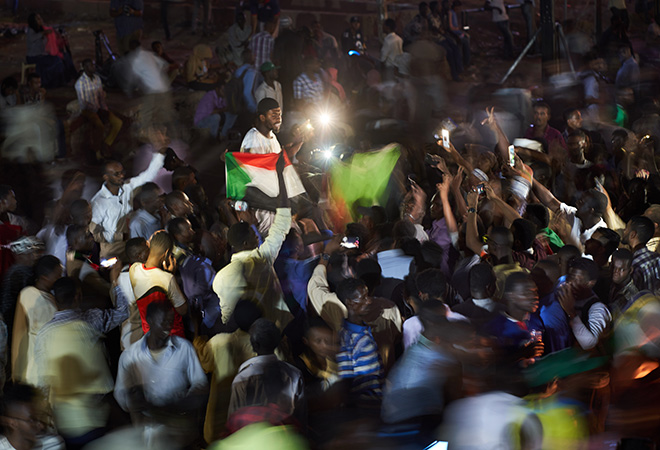-
CENTRES
Progammes & Centres
Location
The AU’s decision to ban Sudan counters the Gulf’s aggressive role in Sudan. It is a major diplomatic feat.

The African Union, through its Peace and Security Council, has decided to suspend Sudan.
The decision was taken against the backdrop of the security operation on 3 June in Khartoum that forcibly dispersed the peaceful sit-in near the country’s military headquarters. The crackdown resulted in a large number of civilian deaths and a breakdown of negotiations for the formation of a civilian-led transitional authority.
When Omar Al-Bashir was unseated from the presidency on April 11 following months of protests and demands for him to step down, it was a tale of two sides – one of jubilation at Bashir’s ouster, and another of the anxiety of what would follow him. Sudanese people were truly hopeful of change. But the Transitional Military Councils (TMC) actions belied their hope and expectations. Sudan’s military regime was simply playing for time all this while.
“The AU Peace and Security Council has with immediate effect suspended the participation of the Republic of Sudan in all AU activities until the effective establishment of a Civilian-led Transitional Authority, as the only way to allow Sudan to exit from the current crises,” the AU tweeted on Thursday, June 6. The AU’s Peace and Security Council will now automatically impose punitive measures on individuals and entities that have obstructed the establishment of a pro-democracy civilian-led authority.
The decision was made unanimously by members at an emergency meeting of the AU in Addis Ababa. The Chairman of the African Union Commission, Moussa Faki Mahamat has called for an immediate and transparent” investigation into the killings. Medical groups associated with the demonstrators – the Central Committee of Sudanese Doctors (CCSD) – said that the figure of causalities was as high as 100 and that 40 bodies were pulled from the Nile river in Khartoum. However, Sudanese authorities have been quick to deny such a high number of causalities.
But what does the future of Sudan holds? What does the AU’s Peace and Security Council’s decision on Sudan count for? What does this decision mean for AU’s legitimacy? These pertinent questions are interesting to answer.
The conventional perception of AU is not a positive one. The AU suffers from a lack of democratic legitimacy of its member states, which impedes its ability to claim to legitimately represent member states’ populations. It lacks the kind of grassroots participation it would need to strengthen its claim to legitimate representation.
There are various longstanding stereotypes about the African Union’s work. People are often disgruntled with its lofty pronouncements and its inability to carry out actions and stamp its legitimacy, as a true pan-African representative. Indeed there are many reasons from the way the AU is wired and operates that leaves a lot to be desired.
Yet, even with all its flaws, defects and imperfections, it would be naïve and foolish to brand the AU’s decision to ban Sudan as inconsequential or as a knee-jerk reaction.
Firstly, the AU’s decision to ban Sudan has isolated and delegitimised Sudan’s ruling TMC. Its international engagement and support will also be frozen. Sudanese authorities will no longer receive any support from the AU to shield them from international pressure and sanctions. Although the TMC sought to forestall the suspension of Sudan from the AU, it failed to do so.
If viewed from the prism of a contest between the ruling TMC and the protest movement, the AU’s Peace and Security Council’s decision to ban Sudan tips the balance in the peaceful protestors' favour. It affirms the legitimacy of the protestors’ demand for civilian authority and lends huge diplomatic backing for their peaceful actions.
Secondly, the decision provides a framework for international actors like the EU and the UN to take a cue from the AU’s quick and assertive action and craft their own policy on engaging with Sudan. A case in point is the EU External Service Action’s press statement which was issued hours after the African Union’s decision. It stated that;
“The European Union joins the African Union in calling for an immediate end to the violence and a credible enquiry into the criminal events of the last days. Equally, the negotiations with the Forces for Freedom and Change towards a civilian-led Transitional Authority need to resume on the basis of the agreements reached so far.” Now, the UN is also expected to come out with a statement in support of AU’s Peace and Security Council’s decision on Sudan.Lastly, AU’s decision to impose a ban on Sudan has helped distinguish between the multilateral based engagement of the AU and the transactional and self-serving approaches of the Gulf – towards Sudan in particular and the Horn of Africa in broader terms.
Interventions, particularly from UAE and Saudi Arabia, have complicated the task of transition in Sudan. Their influence over the TMC has left little room and scope to make concessions or be sympathetic towards the protest movement for a civilian-led transition.
On the other hand, the AU’s decision has served as a countervailing force against the Gulf’s aggressive role in Sudan and upholds the fact that Sudanese stakeholders are the sole authors of their country’s destiny at this critical juncture. No external interference is going to be tolerated.
It is now up to the African Union to mobilise organisations like UN, EU, and Inter-Governmental Authority on Development (IGAD) behind the parameters it has set for achieving a civilian-led legitimate system of government.
But while the AU’s decision has decisively tipped the scale in favour of pro-democracy protestors and their demands for an inclusive government, one has to remain cautious. No single factor can be decisive in complicated situations like this. The international community needs to closely monitor the developments in the upcoming days.
But for now and today, the AU’s action to ban Sudan is a major diplomatic feat with significant consequences. In the times we are in, AU’s decision and stand is commendable and bodes well for democracy.
This commentary originally appeared in The Wire.
The views expressed above belong to the author(s). ORF research and analyses now available on Telegram! Click here to access our curated content — blogs, longforms and interviews.

Abhishek Mishra is an Associate Fellow with the Manohar Parrikar Institute for Defence Studies and Analysis (MP-IDSA). His research focuses on India and China’s engagement ...
Read More +